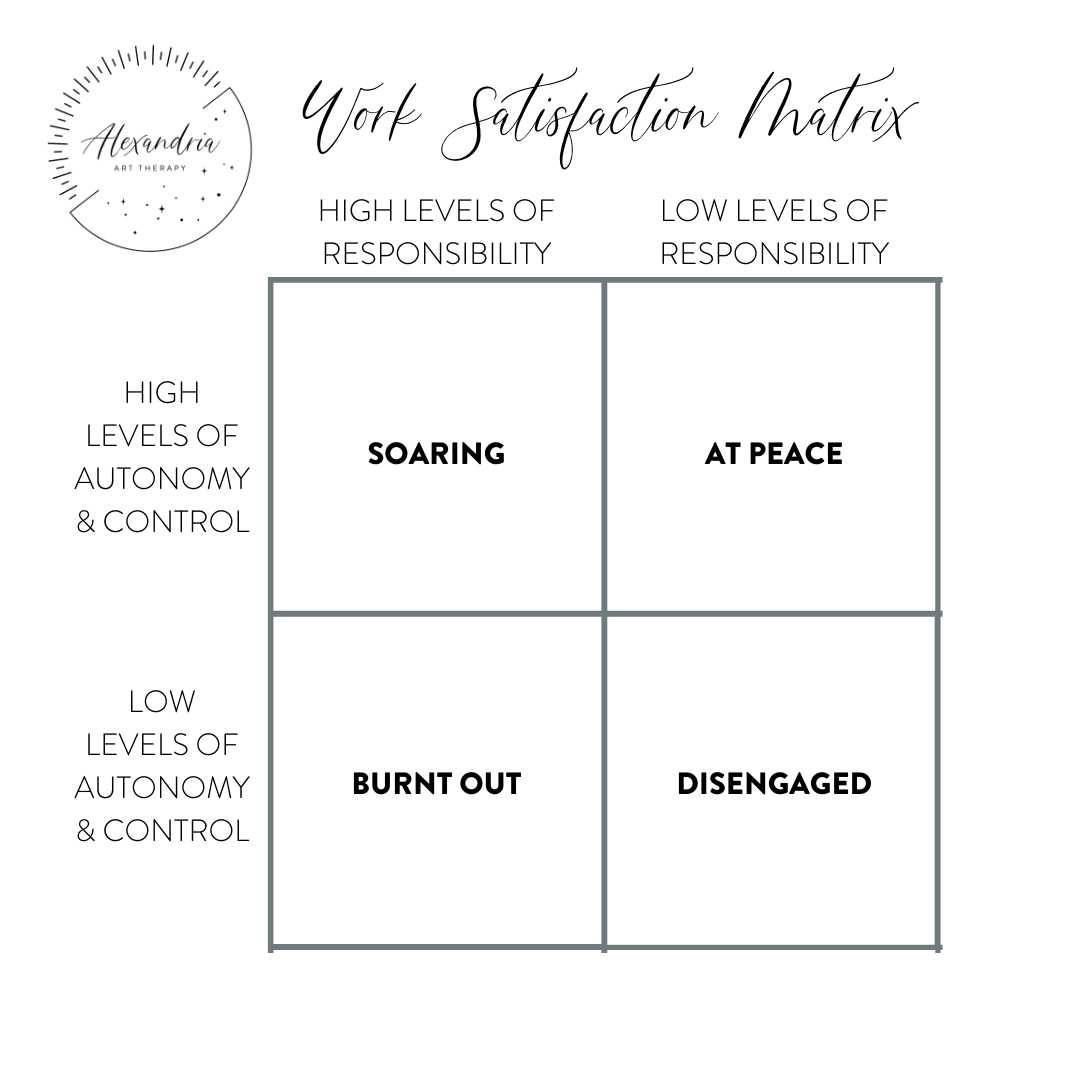A Formula for Burnout, A Formula for Peace: The Unnamed Factors Making You Love or Hate Your Job
Burnout has been a bit of a buzzword lately. More people than ever left their jobs this year, often citing burnout as the reason. I, for one, have been trying to put a finger on why I felt so burnt out in a previous job. On the surface, it seemed like a good fit. It was creative. It had me interfacing with people and managing written communications, two things I consider strengths. But I was constantly feeling like I was treading water--and usually drowning. Even when people complimented my work, I felt like something was slipping through the cracks.
Recently, an internet-friend of mine posted something about burnout that really struck me.
“I was feeling burnt out for a while before the pandemic,” she wrote. “At the time, I thought it was from having too much on my plate. Now I know it was from having a high level of responsibility with little to no control (a recipe for burn out). I definitely have just as much, if not more going on now, but have far greater control over my circumstances/work and am thriving.”
High levels of responsibility + low levels of control (and I’d also add autonomy) = burnout.
This formula blew my mind.
What was wrong with my previous job? Too much responsibility, not enough control over circumstances. Everything I did required layers of clearance, so autonomy felt inauthentic. And the moment I put out one fire, someone would alert me to another. By the time I left that position, I was the definition of burnt out.
This fall I’ve had several conversations with friends and family about work-life balance, and about what makes a sustainable career. Everyone’s looking for that magic formula--what job is going to make me feel useful and make me money, but also treat me with trust and respect (and let me work from home sometimes, let’s be honest)?
Some of it feels a little like hunting a unicorn. But what if the things we should be looking for in a job can be boiled down to something more simple?
If high levels of responsibility + low levels of control and autonomy = burnout, what adjustments to that formula might produce different results?
Let’s first break down what makes a less-than-ideal job.
BURNT OUT - HIGH RESPONSIBILITY, LOW AUTONOMY & CONTROL
You have a lot of things you’re responsible for, but you’re not in a position to make decisions about them. Or things are so chaotic that the work you do ends up being ineffective, or barely makes a dent. (And yet you’re responsible for success.) It’s no wonder this scenario is completely unsustainable. And even taking vacation doesn’t help--these are the jobs where work won’t leave you alone, or where if you do get a break, you get back to your desk and immediately find yourself drowning in everything that blew up while you were gone.
DISENGAGED - LOW RESPONSIBILITY, LOW AUTONOMY & CONTROL
When I say “low responsibility,” I don’t mean low in importance. But a low responsibility job is one where, often, you can leave work at work. You don’t have many or any people working under you. While it may inconvenience your team if you were to take a substantial amount of time off, someone else would pick up the slack, and the world would not end. The problem with this job isn’t the low level of responsibility--it’s the lack of autonomy and control. You don’t have a lot of responsibility, but you’re not granted any flexibility, either. You’re bound to an unyielding schedule or an unyielding corporate system. Maybe your boss is a micromanager, or your company infantilizes you by tracking your productivity such that you can barely take a bathroom break. What does this combo produce? A disengaged employee who feels little loyalty to the company or its mission. If you’re in a job like this, you might feel ready to bounce as soon as a better paycheck comes along, providing the rest of your life can accommodate the transition.
When I think about “low autonomy & control,” I also think about Anne Helen Petersen’s writing about burnout, and the link she makes between burnout and precarity. Precarity, Petersen writes, is “operating with the knowledge that one big life gust (a car accident, a serious illness, a house fire, a lost job) could send you spiraling toward bankruptcy or eviction. It’s living with massive amounts of debt and not knowing how you’ll service that debt if your income stream fails. It’s not having family members in [a] financial position to support you. It’s basically operating without a safety net. Burnout is the feeling that you’ve hit the wall exhaustion-wise, but then have to scale the wall and just keep going.”
Whether your job is high- or low-responsibility, a job that keeps you in a precarious state where you don’t have control over your circumstances will almost always lead to either disengagement or burnout (or one and then the other).
So what else is out there? The other side of our matrix.
AT PEACE - LOW RESPONSIBILITY, HIGH AUTONOMY & CONTROL
Jobs like this begin like the last description--your work isn't super stressful; it’s not life or death. Maybe it feels like low responsibility in part because it’s a good match for your skillset--the work feels easy most of the time. But instead of a micromanaging boss and infuriating company policies, you have autonomy over your work and control over your projects or circumstances. In jobs like this, things feel right-sized. There is trust between you, your teammates, and your boss. You have input on what needs to be done, when, and how.
SOARING - HIGH RESPONSIBILITY, HIGH AUTONOMY & CONTROL
Your job is fast paced, high-demand, and maybe even kind of a big deal. You might feel the weight of being needed (or even being the boss), but you also get to call the shots. You may interface with stakeholders who have input, but ultimately, you feel enabled to make decisions, shape projects, and manage your work or your team in the way that you feel is best. High-responsibility, high-autonomy jobs create the space for you to become a leader people want to follow. These jobs open the door for you to influence change because you are the one setting the priorities. You get to chase what excites you and make things better for your team, clients, or customers.
One thing to keep in mind is that, between “At Peace” and “Soaring,” one isn’t better than the other. One of my biggest beefs with American work culture is that we think everyone needs to be a leader. Some of us don’t want that, even if we might be good at it. Or we have extenuating life circumstances (family responsibilities, mental health considerations) that make a peaceful job more appealing than one where we climb the ladder or juggle a lot of responsibility. Some years or phases of life, we may feel pulled to a peaceful job, while in others we want to achieve, lead, and soar. And some jobs may contain a little of both: times when you shoulder more responsibility followed by seasons where there’s a break. There is no wrong answer in which kind of work you seek--it’s about knowing what feels right for you at this time.
So. Did you find your current job on the matrix? How are the levels of responsibility and autonomy/control at work contributing to your overall mental health? Is it time to start looking for a new job or opening the lines of communication at your current one to see if the balance can shift?
Leaving a job is hard, especially if you’re dealing with precarity because of issues that are endemic to our society. Leaving one service sector job for another, for example, may still not give you the autonomy and control that you need to avoid burnout or disengagement. But much like naming our feelings can help us crack the code to understanding our pasts and our behavior, naming the elements in this matrix can help us articulate what’s working and what’s not. It can help us formulate questions to ask in future job interviews. And it can help us advocate for ourselves and each other when we can.
As Emily Nagoski writes, the cure for burnout isn’t self care (shocker, coming from us, I know): “The cure for burnout is instead all of us caring for each other. It is noticing that somebody is stuck and looking for ways to clear their path…noticing that you are stuck and being willing to ask for and accept help. When you think you need more grit, what you need is more help. When you think you need more discipline, what you need is more kindness.”
We all deserve the opportunity to soar or be at peace. We all deserve to thrive.
Don't miss an update--subscribe to our newsletter to receive new blog posts & the latest news in your inbox every other week.



